|
Winter driving. Does traction control and other driving assisting systems in cars today make for bad or inexperienced drivers in extreme conditions? Watch this latest installment of SkiVlog for some typical winter driving tips and thoughts about driving in adverse conditions which you could invariably experience on your next into the mountains. Don't rely on the auto manufacturers to ensure your safety. Usually accidents happen when the driver runs out of talent, that is assuming the driver had talent in the first place as a result of these computerized systems insulating the driver from what is happening even in mild conditions.
Comments
Check out this new series where The Junk Man talks about Young professionals and how expensive skiing can be. Let me know what you think of this series in the comments or myFacebook page. Remember you DO NOT have to register to comment on my site. Comment, share and subscribe! 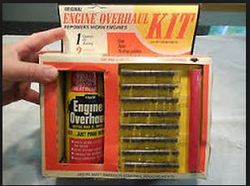 Why buy a new car just to restore the engine? (sarcastic voice added) Why buy a new car just to restore the engine? (sarcastic voice added)
The Yale Automotive Engine Overhaul Pellets, the magic beans of the automotive world. The $4.95 solution to the only automotive problem you will ever have. Famously advertised in such reputable publications as Popular Mechanics and sold through JC Whitney Co.
For the younger automotive enthusiast, and by that I mean anyone born after 2000 the idea of miracle products that make farcical claims like rebuilding your engine as you drive are not as prevalent as they once were. B.I. or Before Internet as I like to call it you would have to catch a late night/early morning 30 minute infomercial showing an engine running with no valve covers and no oil pan, and then shooting it with a fire hose while it is running. I guess this was to prove that in case your mechanic forgot to install some critical engine covers that you could still drive your car home in a monsoon. Older readers (us B.I.'ers) will know these by the names of Dura-Lube, Pro-Long, Long-Dong (ok I made that last one up). Now these oil additives are still around but they lack the sensationalized promotion and outrageous claims as in the late 90's the FTC got involved cracking down and even bringing judgments against these and other companies making these wild and largely false claims. However a trip down memory lane and cracking open some old Popular Mechanics magazines from the 50's-70's reveal some pretty notorious if not down right hilarious adverts for products that literally claim you will never have to "rebuild" your engine. Just $4.95 every 10,000 miles, or in the case of Yale Engine Overhaul pellets I want the ones they made on the left as you get an extra 5,000 miles free. Read on to see how these work... 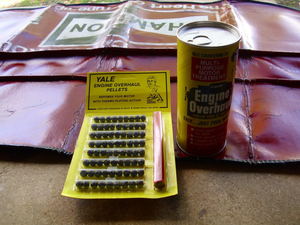 Magic engine serum with suppositories Magic engine serum with suppositories
Most people would remember this product being featured in the pages of Popular Mechanics, Car Craft and others while being sold though the ads (post paid) and through a gearheads favorite toilet reading material, the JC Whitney automotive parts and accessories catalog. A place where you can buy your engine rebuild in a can right along side your tail pipe whistler and musical horn.
My research shows that these pellets were merely balls of some sort of wax, possibly laced with other ingredients. I could not confirm this. Item of note parafinic waxes exist in most base stocks of conventional motor oils. By how the directions read the idea seems like it could work (and I use that term very loosely here) until you really think how a typical 4 stroke combustion engine works. Back when these were first marketed metallurgy for engine parts and engine oils themselves were adequate at best, so some types of additives were not all a bad thing because the oil itself didn't contain much of anything for an additive package like they do now. First, even though the cylinder temp would be hot enough after the initial start to melt wax I am not sure how the melted pellets are supposed to stay in the cylinder long enough to "re-plate the cylinder wall" and "seal the piston rings". Seems to me most of these melted beans would exit the cylinder via the exhaust valve and potentially solidify somewhere down the line in the exhaust, to then collect carbon and soot and maybe plug a muffler overtime. For the record these were marketed heavily before catalytic converters and EFI were required, but research shows they were sold up until about 2008 (source: internet lore, see below) It makes me wonder how catalytic converter safe these were considering over rich mixtures and oil burning can overtime degrade the catalysts and in extreme cases cause it to go into meltdown. 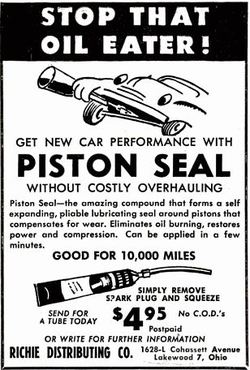 A similar type product that believe it or not scares me more than the magic beans. A similar type product that believe it or not scares me more than the magic beans.
Honorable mention Piston Seal. The way the advert reads it similar to the Yale pellets only in convenient squeezable tube form. You still have to remove spark plugs for injection directly in the cylinders atop the pistons. The advert does not specify the size of the tube. I question if the dosage is one tube per cylinder or does a whole tube "fix" up to an 8 cylinder engine?
Picture commentary; is it illegal if your car is doing the drinking and not you? Maybe this is like toothpaste for your car.
A closer look at the Yale Automotive Engine Overhaul pellets. Or magic beans as I call them. Listed below is the directions and some of the benefits claimed by the product.
It is hard to date this sell sheet below featuring some YALE automotive products. The contact info is still current forCustom Pak Illinois INC. which is the packaging and filling supplier. The two sizes of muffler cement are still available, but the pour in oil additive kit is not. Which is a shame. I have some ideas for some tests I would like to perform.
|
Details
AuthorJon "the junk man" helping to promote responsible riding and recreation whether it be at the track or at the trail. Your source for motorcycle how to videos and much more! Archives
February 2023
|
Proudly powered by Weebly

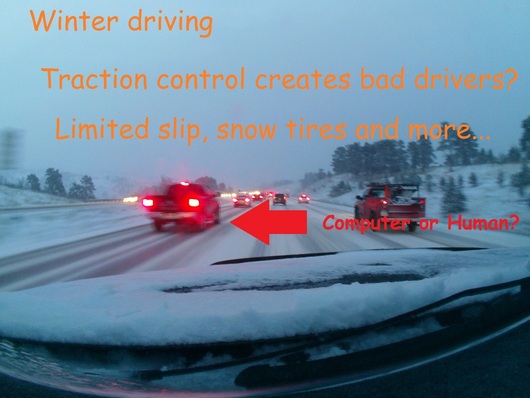

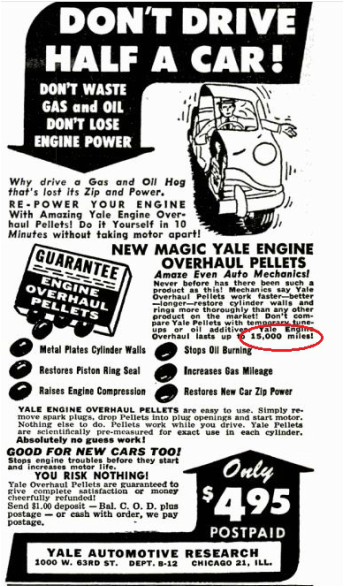
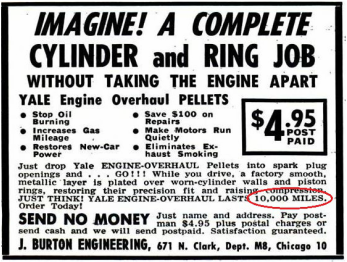
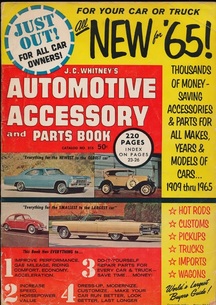

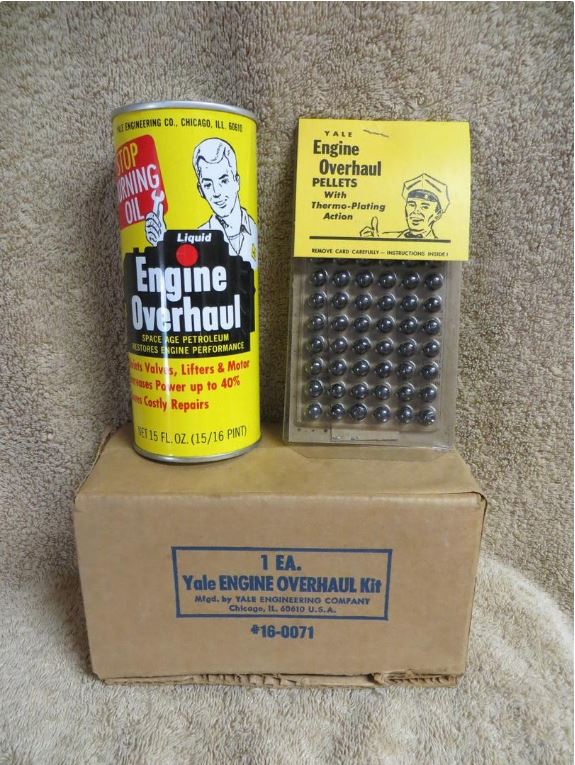
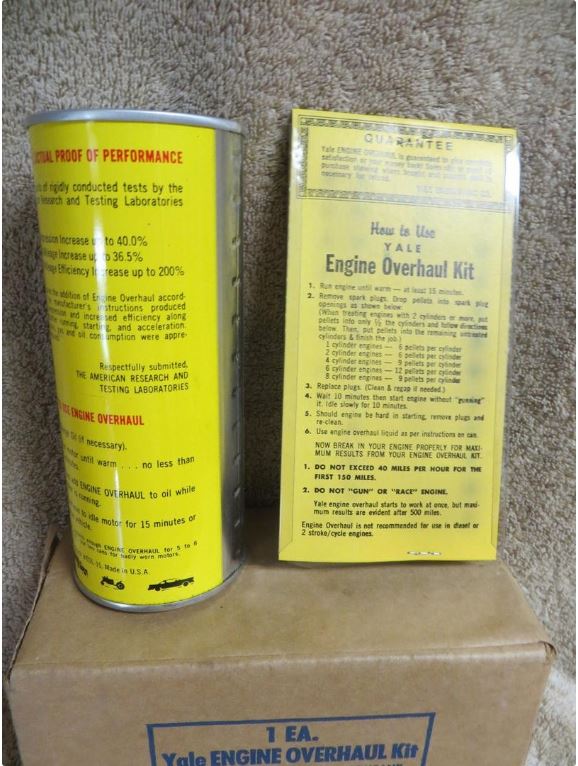
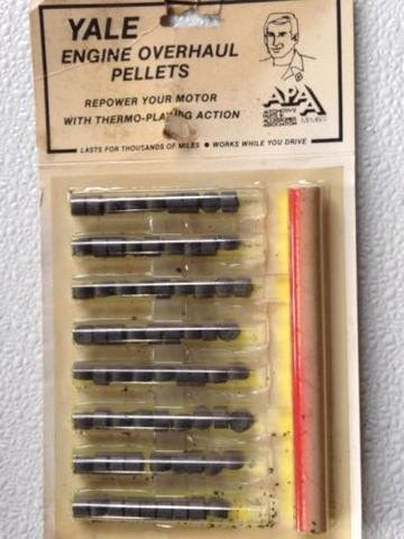
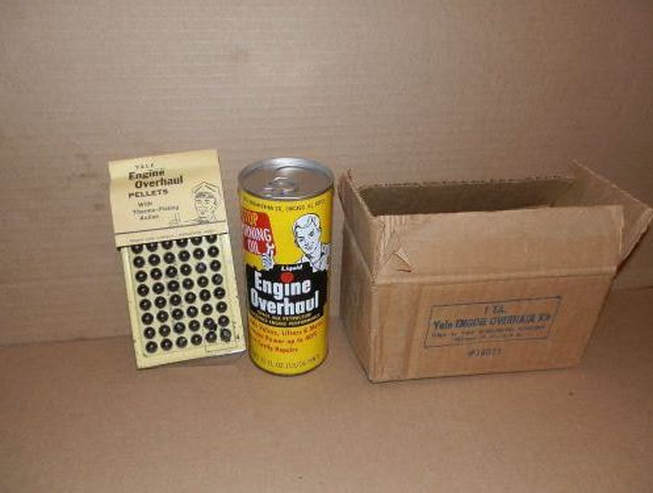
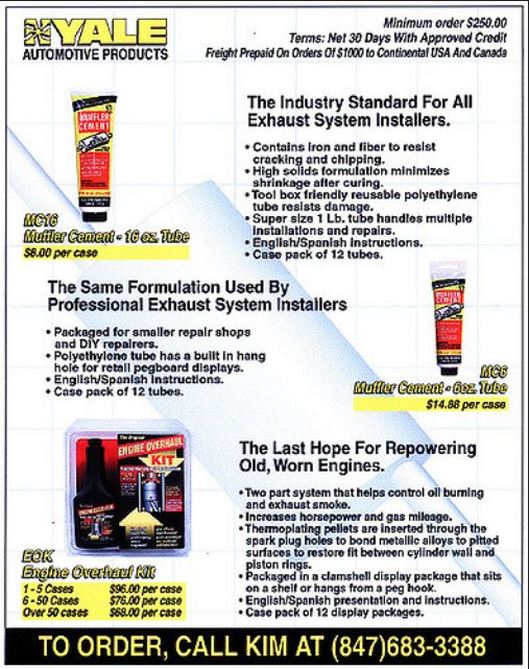
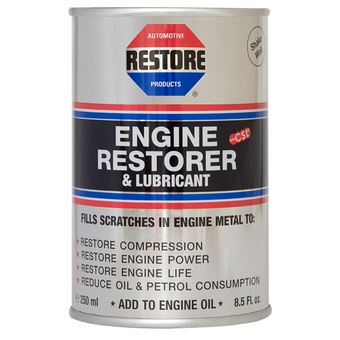
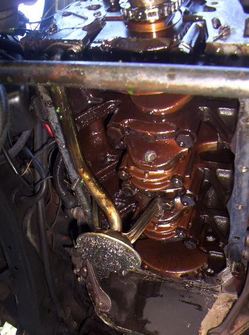



 RSS Feed
RSS Feed
